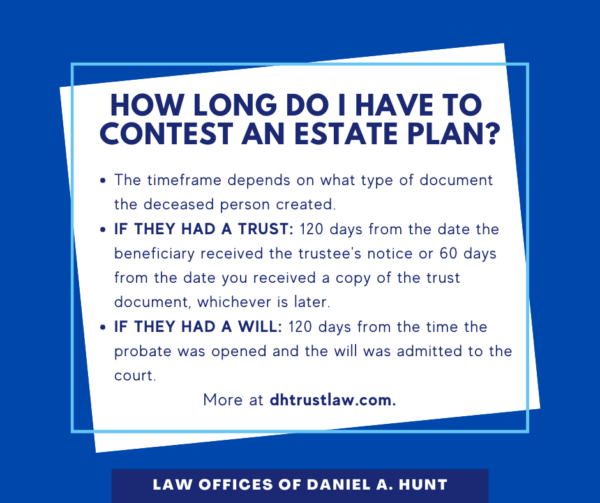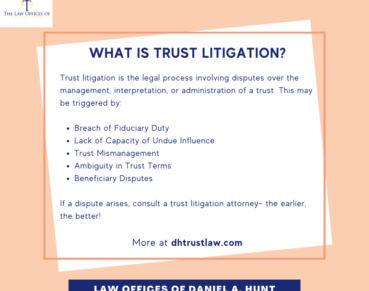How Long Do I Have to Contest a Trust or Will in California?

If your loved one has passed away and you’re considering contesting their estate plan, you need to understand the timelines involved. Many beneficiaries ask, “How long do I have to contest a trust or will in California?” The answer depends on what type of estate plan the deceased person created.
How long do I have to contest a trust?
If you are the beneficiary of a living trust, the California Probate Code requires the successor trustee(s) to notify you of the trust’s administration within 60 days of the settlor’s death. After you receive this notice from the trustee, a statute of limitations begins. If you want to contest the trust, you must take action within 120 days from the date the notice was served or 60 days from the date you received a copy of the trust document, whichever is later.
If the trustee’s notice was delayed or missing information, then the standard statutes of limitations apply – typically three years. But the further away you get from the date the decedent passed away, the harder it may be to win your case.
If the trustee never sent notice at all, then there is no statute of limitations to contest. But if you try to challenge a trust after too much time has passed, the court may not allow it.
Your best chance to avoid any potential missed deadlines is to seek the advice of an experienced trust litigation attorney early on for guidance on how to proceed.
How long do I have to contest a will?
If the decedent died with a will in place, the timelines are different than with a trust. The estate administration will be handled by the named executor in the California Probate Court. The executor must notify all beneficiaries at least 15 days before the initial probate court hearing.
To contest the will being submitted to the court, you should plan to appear at the initial hearing to object. The court will typically then grant you a period of time to file a written objection in which you must state the legal grounds upon which you are challenging the will’s validity. The court will then make a decision on whether to sustain your objection or not.
If you did not receive notice of the hearing and missed the opportunity to object and the will was deemed valid by the court and admitted to probate, you still have one last chance to contest the will. If you file a petition with the court within 120 days after the probate is opened, you can state your legal grounds for contesting the document and ask the court to revoke its order admitting the will.
What are valid reasons to contest an estate plan?
Disagreeing with the distribution of an estate is not a sufficient reason to contest the document under California law. In order to successfully contest a trust or will, you must be an “interested party” – either a beneficiary or an heir at law- and you must have a valid reason.
Here are a few examples of valid reasons to contest an estate plan:
- The person who created the estate plan lacked mental capacity when they signed it
- A third party persuaded the decedent to change their estate plan to favor themself
- Forgery of the signature on the trust or will
- A defective document that was not drafted or executed properly
- Multiple documents have been discovered, such as two versions of a trust or will
If you have any questions about this topic, feel free to contact our law firm.
Law Offices of Daniel A. Hunt
The Law Offices of Daniel A. Hunt is a California law firm specializing in Estate Planning; Trust Administration & Litigation; Probate; and Conservatorships. We've helped over 10,000 clients find peace of mind. We serve clients throughout the greater Sacramento region and the state of California.




